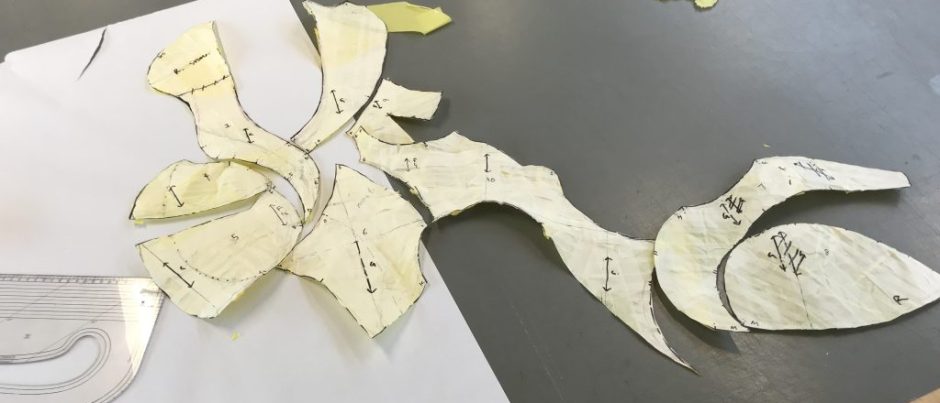Contextual background
I concurrently support a large number of students across the performance programmes, at different stages of their academic journeys. The students bring a variety of technical ability and experience to these interdisciplinary and experimental programmes, which evolve into specialist needs that shift and change through the development of their individual performance practices.
Evaluation
Anticipating and supporting such a vast web of specific technical needs can be challenging. Familiarity with briefs, leading technical workshops, and attending production meetings help my colleagues and I to anticipate or react to trends of interest. For example, last year there was an influx of interest in use of Latex. Consequently, we sought additional training in order to support the use of this very specialist material, producing openly accessible learning resources, and planning the delivery of workshops. However, we cannot always anticipate what our students will require, and a reactive approach is often not immediate enough for the timescales we work to.
Moving forwards
Teaching technical research skills
I would like to place more focus on the development of independent technical research skills and tacit sensorial ability (Makovicky, 2010) as objectives within pre-planned technical workshops, as well a organic interactions with students in the studio, to empower them with the ability to acquire the specialist knowledge they require independently. This could be through the introduction of activities such as Object Based Learning (Orgill and Willcocks, 2024). I will bring this to the table at my next departmental technical de-brief, with a view to bring this into our joint delivery of workshops in the new academic year.
Fostering communities of practice
The diversity of practice in the studio creates a rich and creative pedagogic environment, which has more potential to facilitate organic dialogic exchange between peers (Orr and Shreeve, 2017). Following a discussion with my postgraduate certificate colleagues around ‘where learning takes place’ in a workshop, and on reflecting upon strategies which “build community” offered by Bamber and Jones (2015) I would like to investigate facilitating a creative social club or activity within the studio to cultivate a stronger culture of knowledge exchange and peer to peer learning in a low pressure context.
Sustaining dramatic friendships
The fifteen hours of timetabled workshops we deliver to BA(Hons)P:DP students in their first year at CSM instigate the formation of dramatic friendships (Patience, 2008), which are an important part of the way in which we relate to and understand students on an individual level, and lay a foundation for positive, productive interactions with them gong forwards. However, these relationships can wane, through reduced contact time. Encouraging active participation in the ecosystem of the studio through the above means, as well as the instigation of some mandatory (as oppose to optional) workshops spanning across the fullness of each program may help to sustain these relationships.
(466 words)
References
Bamber, V. and Jones, A. (2015) ‘Challenging Students, Enabling Inclusive Learning’. In Marshall, S., Fry, H. and Ketteridge, S. (eds.) A Handbook for Teaching and Learning in Higher Education: Enhancing Academic Practice. 4th ed. London: Routledge. Pp. 152 – 168.
Makovicky, N. (2010) ‘“Something to talk about”: notation and knowledge-making among Central Slovak lace-makers’. The Journal of the Royal Anthropological Institute .16. Pp.80 -99
Orgill, G. and Willcocks, J. (2024) ‘How to…use objects to support learning and teaching’ [online seminar]. Postgraduate Certificate in Academic Practice: Theories, Policies and Practices. University of the Arts London. 24th January.
Orr, S. and Shreeve, A. (2017) ‘Teaching practices for creative practitioners’. In Orr, S. and Shreeve, A. (eds.) Art and design pedagogy in higher education: knowledge, values and ambiguity in the creative curriculum. Milton: Taylor and Francis Group.
Patience, A. (2008) ‘The Art of Loving in the Classroom: A Defence of Affective Pedagogy’, in Australian Journal of Teacher Education, 33(2), pp.55-67. Available at: https://ro.ecu.edu.au/ajte/vol33/iss2/4/ (Accessed: 20 January 2023).
